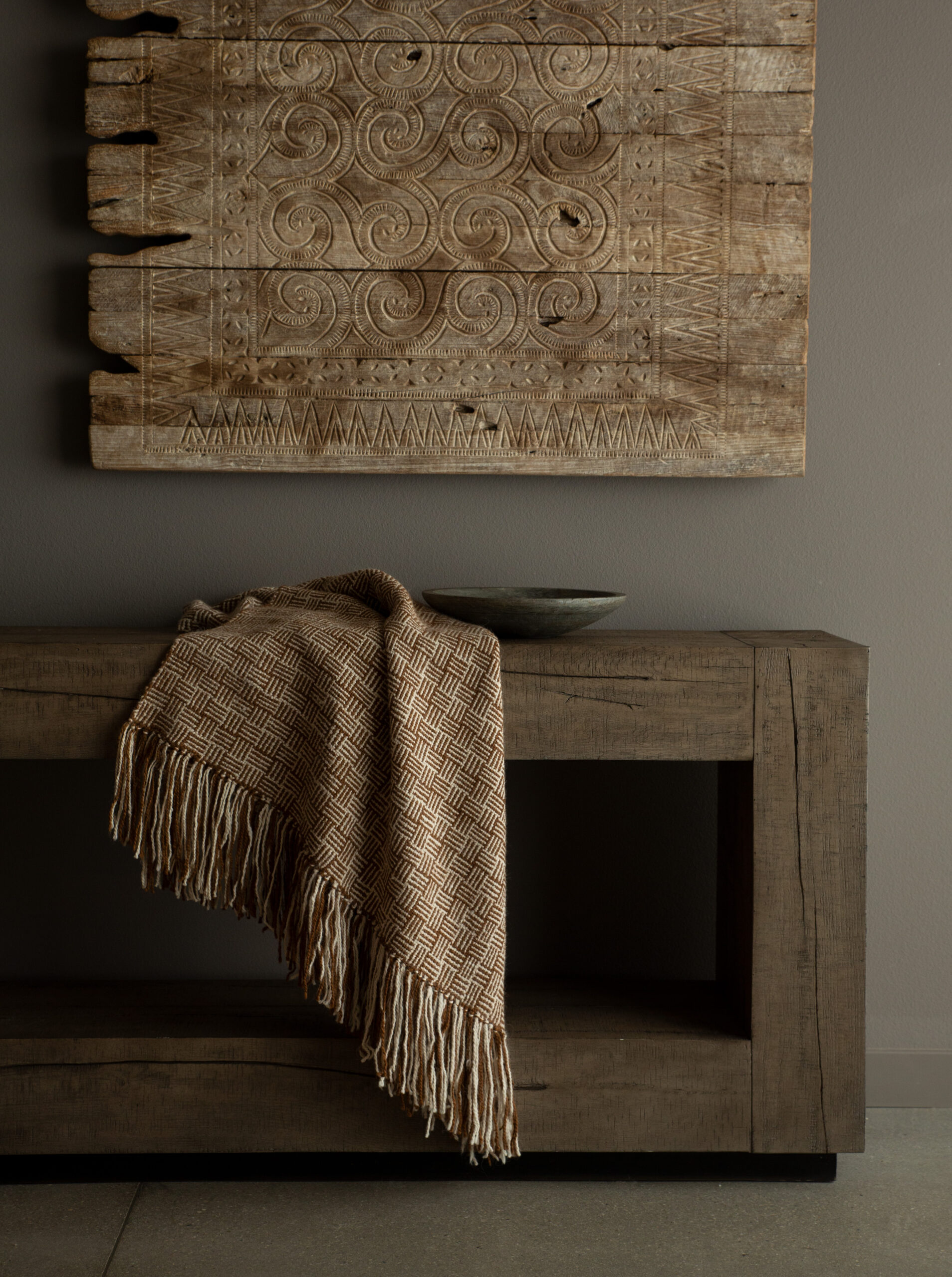ETNICO Trade Co. Brings Ancient Weaving Techniques to the Modern World
By Shelby Tuttle
Deep in the heart of the Andean states, throughout some of the region’s most remote and rural communities, live some of the utmost skilled artisans of our time. Through ancient weaving techniques that date back thousands of years, these artificers meticulously tend to their craft – laboring only by the light of the sun – to work the yarn and loom that produces some of the finest textiles in the world. These masterfully woven works of art are showcased in Scottsdale-based ETNICO Trade Co.’s collection of home goods.
 When world supply chains came to a screeching halt in the midst of the recent pandemic, Esteban Ibarra was working as a senior vice president overseeing the sales division of a major multi-national IoT provider. His brother-in-law, Juan Martin, had spent the last 20 years in a much different professional capacity, trading Andean textiles. In May 2021, he approached Ibarra with a request for a small purchase to help some of the artisans he does business with get back to work. Ibarra was in for the purchase – and, as it turns out, so much more.
When world supply chains came to a screeching halt in the midst of the recent pandemic, Esteban Ibarra was working as a senior vice president overseeing the sales division of a major multi-national IoT provider. His brother-in-law, Juan Martin, had spent the last 20 years in a much different professional capacity, trading Andean textiles. In May 2021, he approached Ibarra with a request for a small purchase to help some of the artisans he does business with get back to work. Ibarra was in for the purchase – and, as it turns out, so much more.
“It got me thinking – what’s going to happen next month to these people? And the month after that?” Ibarra remarked. “The pandemic wasn’t slowing down, and most countries in Latin America had a long quarantine. Argentina had a very strict quarantine for 18 months, forcing people to stay home, leaving many unable to earn a living.”
When Ibarra received his small order in the summer of 2021 containing a few llama shawls, ponchos, and ruanas, as well as some sheep rugs, he immediately loaded them into his car and went to every interior designer and home decor retailer that he could think of to validate the product. He asked a simple question: “Would you buy this?”
“The reactions were more than validating – they didn’t know who I was, but they couldn’t resist the quality. The feel, the colors, the artistry. They loved it!” he exclaimed. “I thought, ‘This could be just the beginning.’ The idea for ETNICO seemed almost impossible – but it was a most needed change for me personally.”
Ibarra knew he had something special, and shortly thereafter, ETNICO was born. He and Martin became business partners, working in concert to support the people of the Andean states through the procurement of incredible woven goods. Sourced from llama, sheep, and vicuña, the wool produced for ETNICO’s sumptuously soft products is acquired from artisans across the entire south-central region of the Andes, including Argentina, Bolivia, and Chile.
The llama, specifically, plays a very important role in Andean culture. According to Ibarra, all of the artisans that ETNICO partners with breed and care for their animals through ancestral sustainable practices that date back several generations.
“With a profound respect for the animals’ natural cycle, they extract the wool carefully by hand during the right season in preparation for temperature shifts and to help the animals acclimate. In turn, this allows the artisan to continually source and maintain the highest quality of raw material,” Ibarra remarked.
That material – combined with thousands of years of masterfully crafted techniques handed down through generations – produces the finest thread made of long, super-fine gauge fibers that is then woven into an extremely soft finished product.
 In the beginning, Ibarra and Martin focused primarily on the Andean region within Argentina, as both men have personal connections to and affinities for the area. Ibarra was born and raised in Buenos Aires, while Martin resides in the northern region bordering Bolivia and Chile. As the need for more pieces has grown, so has the duo’s ability to support artisans in other regions. Although most of Martin’s relationships have been forged over decades and even cross into friendships, new relationships can sometimes require patience and an establishment of trust. Ibarra cites the influence of the Spanish colonization of the area during the 1600s as a reason for the peoples’ distrust of outsiders, which brought a drastic and permanent change in the way of life in the Andean region.
In the beginning, Ibarra and Martin focused primarily on the Andean region within Argentina, as both men have personal connections to and affinities for the area. Ibarra was born and raised in Buenos Aires, while Martin resides in the northern region bordering Bolivia and Chile. As the need for more pieces has grown, so has the duo’s ability to support artisans in other regions. Although most of Martin’s relationships have been forged over decades and even cross into friendships, new relationships can sometimes require patience and an establishment of trust. Ibarra cites the influence of the Spanish colonization of the area during the 1600s as a reason for the peoples’ distrust of outsiders, which brought a drastic and permanent change in the way of life in the Andean region.
“Still today, there is a cultural barrier and mistrust with the ‘gringo,’ or what they call a modern European-looking person,” he says. “It takes time. Every textile is viewed as a piece of their culture with true meaning. So, for us to have the privilege to share these authentic pieces with the rest of the world, makes the relationships and our work even more meaningful.”
Each rooted in its own artistic legacy driven by natural resources and cultural inheritance, the patterns, colors, and styles of ETNICO’s woven tapestries are as unique as the regions they hail from. The work of Argentina’s and Chile’s artisans produce gorgeous, unaltered earth-tone textiles that reflect the natural color of the animal’s wool, whereas Bolivian artisans favor deep, vibrant colors, utilizing pigments derived from flowers, fruit, roots, and vegetables.
“All of our golden-tone textiles are hand-dyed with onion peel,” remarked Ibarra.
The process of obtaining these unique pieces is both laborious and time intensive. Each month, Martin begins in the northwest corner of Argentina in San Salvador de Jujuy and travels by truck through the Camino Real – the original trading route built in the region during the Inca Empire. At least twice a year, Ibarra leaves his home in Arizona to join Martin on his journey to visit the remote communities. Each time, whether alone or with Ibarra, Martin stops to visit the homes of the artisans in the most remote of communities – usually no more than 50 residents living completely off the grid – to collect the pieces he ordered the month before and place new orders for the month ahead. As one might imagine, production slows considerably during the winter months when the weather, shorter days, and lack of raw wool pose significant challenges. Some of the towns favored by Ibarra and Martin are actually 12,000 feet above sea level.
 Each monthly visit nets a respectable but varied lot of items from 23 artisans. Seasonality, item size, and individual production time all come into play. As a reference point, Ibarra notes that a king size llama blanket takes approximately four days of full-time weaving to complete, in addition to the time needed to make the yarn. And while the work is deliberate and refined in process, in under two years, this small-but-mighty, socially conscious company has introduced over 96 woven works of art across 15 collections to individual buyers and design professionals in five domestic markets and many more across the U.S., thanks to ETNICO’s online marketplace. ETNICO’s most recent product line includes a luxurious, yet delicately cozy collection of pillows, throws, rugs, and bedding, all directly and ethically traded from artisans in Argentina.
Each monthly visit nets a respectable but varied lot of items from 23 artisans. Seasonality, item size, and individual production time all come into play. As a reference point, Ibarra notes that a king size llama blanket takes approximately four days of full-time weaving to complete, in addition to the time needed to make the yarn. And while the work is deliberate and refined in process, in under two years, this small-but-mighty, socially conscious company has introduced over 96 woven works of art across 15 collections to individual buyers and design professionals in five domestic markets and many more across the U.S., thanks to ETNICO’s online marketplace. ETNICO’s most recent product line includes a luxurious, yet delicately cozy collection of pillows, throws, rugs, and bedding, all directly and ethically traded from artisans in Argentina.
In 2022, Ibarra and Martin also fulfilled their goal of reallocating $35,000 in profits to support social projects and initiatives that address a wide range of environmental, health, social, and economic concerns within the artisan communities they trade with.
7530 E. Main Street, Ste 101, Scottsdale, etnicotrade.com.







